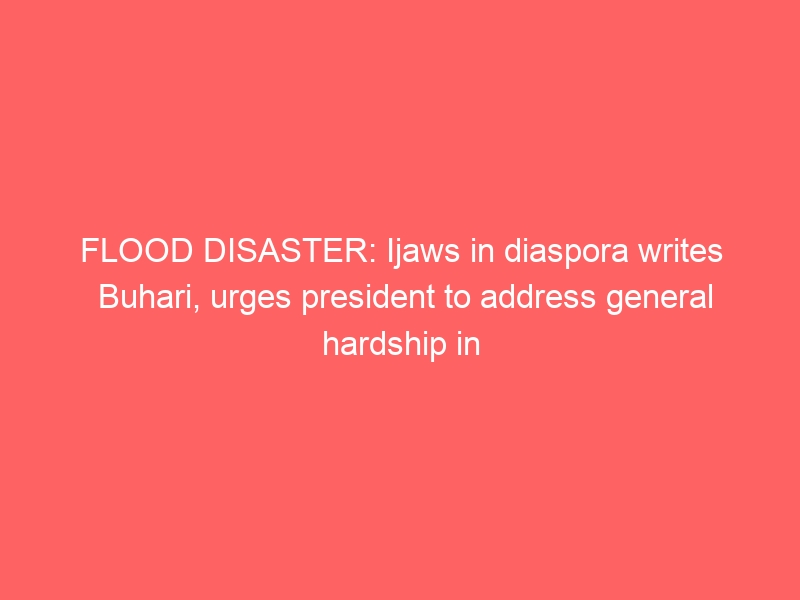FLOOD DISASTER: Ijaws in diaspora writes Buhari, urges president to address general hardship in Ijaw land
Ijaw Diaspora Council (IDC), a socio-culural organization has called on President Muhammadu Buhri to take urgent steps to address before it gets out of hands, underdevelopment, poverty and general hardship in Ijaw lands resulting from the divesting flood which swept through the states of the Niger Delta region.
Speaking through an open letter addressed to the President dated December 2, 2022 and signed by Prof. Monday Selle Gold, President of Ijaw Diaspora Council, of which a copy was made available to GbaramatuVoice on Saturday, the group stated that; “The recent flood across 22 states is a constant reminder of the issues we face as a part of the global community and the ever-present threat that climate change portends to our corporate existence.
ALSO READ: Tears, sorrow and blood as Patani community battles flooding
They therefore called on Mr. President, as a way forward, to build reservoir dams to control the water from the Lagdo dam in the Republic of Cameroon whenever they decide to release dammed waters.
The letter reads in full: On behalf of the Ijaw Diaspora Council (IDC), I wish you good health as you return from your medical trip in the United Kingdom. May God Almighty give you the enablement to bequeath us a credible election as you have promised on several fora.
Your Excellency, this letter is written with passion, pure patriotism, and good intent for Nigeria. As the days go by, we draw ever closer to the end of your administration.
The recent flood across 22 states is a constant reminder of the issues we face as a part of the global community and the ever-present threat that climate change portends to our corporate existence.
Mr. President, as concerned stakeholders in the Nigeria project, the Ijaw Diaspora Council (IDC) is deeply saddened about the loss of lives occasioned by the flood and the suffering of millions whose lives have been so dreadfully affected by the devastating floods across our dear country.
Your Excellency, we have deemed it necessary to write this open letter to you to draw the attention of your Office to the ravaging flood that has devastated most of the Ijaw states in the Niger Delta region.
Mr. President, the impact is so severe that it’ll take years for many communities to recover. This no doubt has compounded the immense environmental pollution and its associated health issues the Ijaws have been facing for decades now. The following are also ‘albatrosses’ the people are forced to contend with.
1) Environmental degradation in oil-bearing communities.
2) Poverty, social and economic exclusion, absence of basic infrastructure and general underdevelopment.
These situations persist despite the enormous sacrifices the Ijaw people have made to sustain the economy and democracy of Nigeria.
It is no news that flood of 2022 was more ferocious and devastating than the 2012 flood. The destruction of lives and properties is unprecedented and is clearly the worst in our history. The rising floodwaters sacked and rendered our people homeless. It overtook our fishponds and farms, damaging crops, seeds and seedlings. Business activities came to a halt as shops, schools, and government offices closed down. Critical roads were washed off and made impassable as access to Yenagoa, the Bayelsa state capital, from Rivers and Delta state through the East-West Road was cutoff. Boats and canoes became beds, kitchens and the only means of transportation within our towns and villages. In most parts of Ijawland, people wade through water to move from one place to another.
Prices of foodstuffs were not spared as inflation has soared. A bag of rice sells for N60,000 from a low of N30,000 before the flood. That 100% increase in the price of a bag of rice reflects price increases in essential commodities, including and other food items. Petroleum products too have taken a serious hit, leading to scarcity. The people also faced health situations because the floodwaters contaminated drinking water. Under such conditions, epidemics broke out and became rampant.
Short-term measures by the Bayelsa State Government of Bayelsa State to provide temporary shelters mitigated and reduced the severity of the effect for people in the state capital, but it was not enough to cover the entire state.
As an organization, IDC is reaching out to concerned citizens in the diaspora and global relief organizations, including our members, to provide relief to our people in our homeland. Such organizations include Federal Agencies, International Donor Agencies like the World Food Program, the World Bank, the International Society of the Red Cross, and the oil companies operating within our shores.
Mr. President, as a way forward, we are proffering the following solutions and remedies:
1) Build reservoir dams to control the water from the Lagdo dam in the Republic of Cameroon whenever they decide to release dammed waters. The dams will reduce the volume of water flowing downstream and thereby minimize the impact of flooding. Added benefits would be the generation of electric power as well as irrigating opportunities for adjoining farmlands.
2) The opening of canals between towns in Ijawland for easy movement of personnel by boats since the perennial flooding occasioned by climate change will be part of their existence.
3) We must strengthen the institutions set up to manage disasters and emergencies, such as the National Emergency Management Agency and the state counterparts. These institutions must have access to relief materials early enough to meet the kind of emergency we faced with this flood.
4) Use town planning to ensure that future infrastructural development and housing are done on high grounds in the towns and cities in the Niger Delta and other parts of Nigeria. The planning should incorporate and collaborate with relevant agencies to develop early warning systems and make adequate plans to meet imminent natural disasters.
5) The response was fast in state capitals like Yenagoa but slow in the Local government areas. We therefore propose that structures like civic centers in the LGA headquarters be built and used as temporary shelters for victims of natural disasters as well as being put to other uses when necessary.
It has become imperative, Mr. President, for high-level government officials to visit the affected areas, provide emergency relief materials for the victims and provide seeds, seedlings and plant cuttings for use in the next planting season. To tackle the problems of climate change, the World Bank Group has committed about $70 billion. We can access this fund as a country, and the government should set up structures to engage these international bodies.
We are determined to collaborate with relevant organizations in Nigeria to minimize the losses our people incurred during the floods moving forward. We are speaking to regional organizations to strengthen our resolve to stand together in the face of environmental changes. Our hope in adopting this approach is to minimize the loss of human lives and economic destruction and preserve our race as a people.
Mr. President, as we prepare for the 2023 elections, governance must continue. The time is now to take a bold step and leave Nigeria with a lasting legacy of good, proven, trusted, capable leadership.












